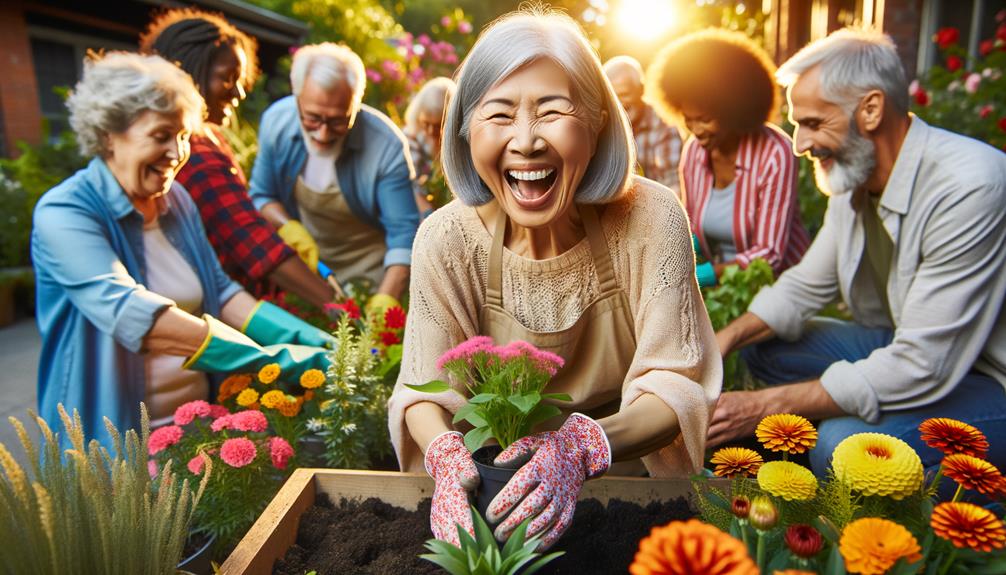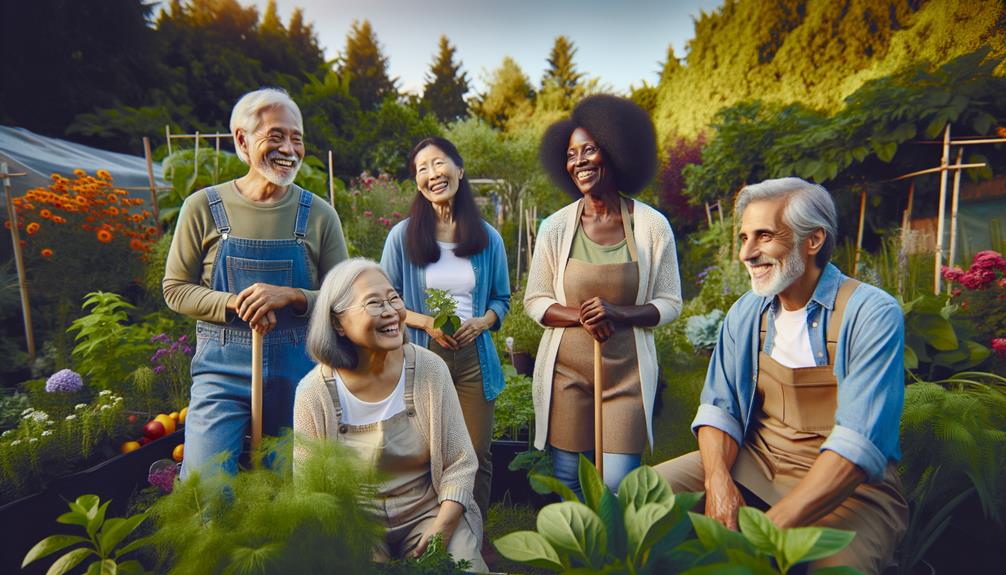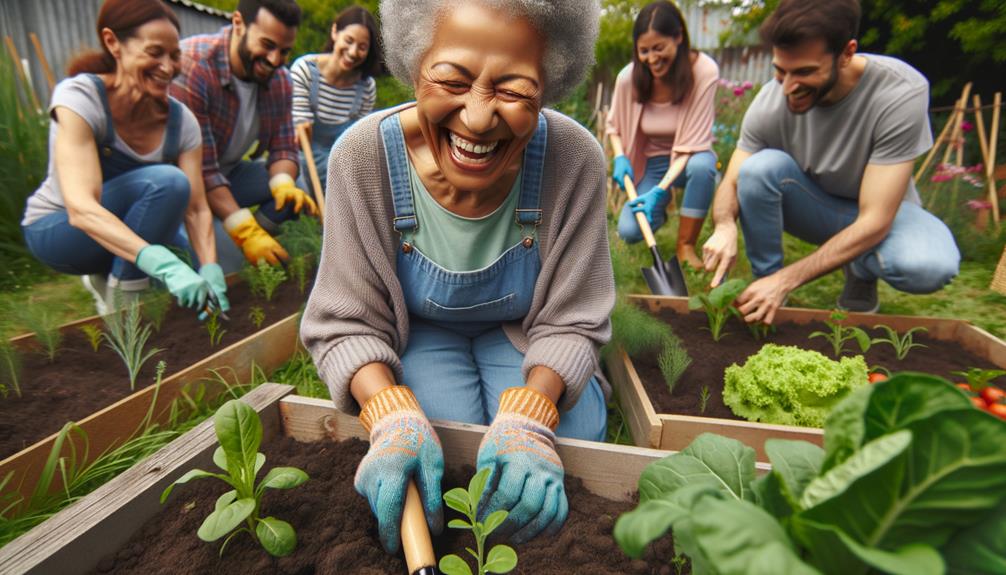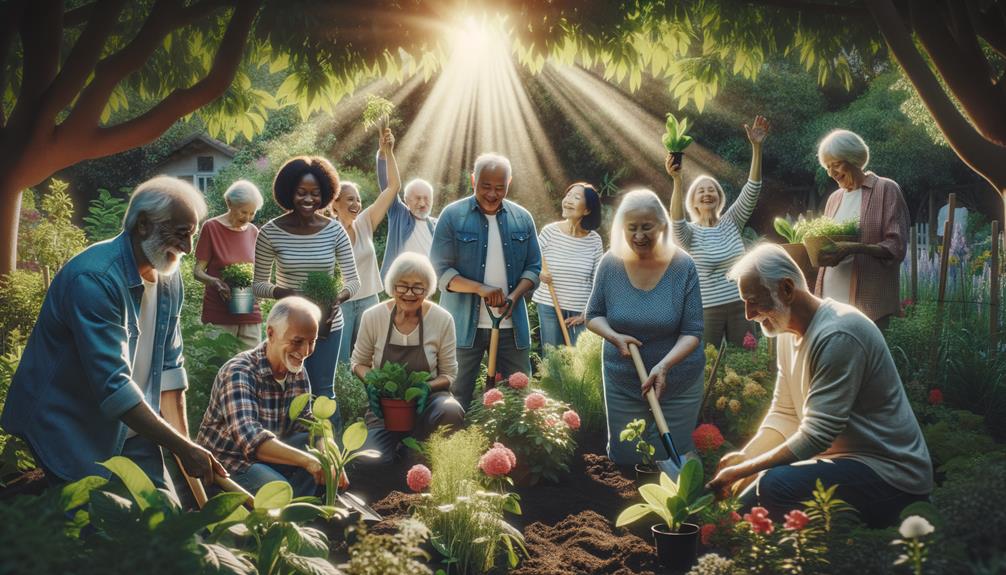Volunteering offers numerous benefits for seniors. By staying mentally active through volunteer work, we reduce the risk of dementia and feel a greater sense of fulfillment. Participating in volunteer activities helps combat feelings of isolation and depression, leading to increased life satisfaction and self-esteem. Social connections and a sense of belonging strengthen, reducing loneliness. Volunteer work also encourages physical activity, enhancing mobility and overall health. By connecting with younger generations, we share our wisdom and enrich our community ties. Through volunteer efforts, we develop new skills and continue growing personally.
Enhances Mental Health
Volunteering keeps seniors' minds engaged, which is crucial for their mental well-being. When older adults participate in meaningful volunteer activities, they maintain an active brain, essential for their overall health. Research shows that seniors who volunteer regularly experience a greater sense of fulfillment and accomplishment, leading to a positive outlook on life and tangible benefits for their mental health.
When we volunteer, our minds are stimulated through problem-solving, social interaction, and new experiences. This helps reduce the risk of dementia by keeping our cognitive functions sharp. Studies indicate that seniors involved in regular volunteer work are less likely to develop dementia and other related health issues. This connection between an active brain and mental health underscores the importance of continuous engagement in stimulating activities.
The sense of fulfillment derived from helping others significantly enhances our well-being. Knowing that our efforts are making a difference can lead to increased happiness and a more positive outlook on life. By participating in volunteer work, seniors not only contribute to their communities but also take essential steps towards safeguarding their mental health and maintaining cognitive vitality.
Reduces Isolation

When seniors volunteer, they can break free from feelings of loneliness and isolation. Research shows that a staggering 88% of seniors who felt socially isolated experienced a significant decrease in isolation after volunteering. By building meaningful relationships and engaging with others, senior volunteers can greatly improve their sense of belonging and community.
Builds Social Connections
Engaging in volunteer activities has a profound impact on reducing social isolation and loneliness among seniors. By participating in volunteer work, seniors can foster meaningful social connections, leading to increased social interactions and a stronger sense of belonging. These connections significantly enhance their mental well-being and overall quality of life.
Volunteering provides opportunities for seniors to form meaningful relationships and friendships within their community. When seniors engage with others, they share experiences that create a sense of connection and support. This community engagement not only reduces feelings of isolation but also enriches their lives by providing a network of caring individuals.
Here's a visual representation of these ideas:
| Benefits | Description | Impact on Seniors |
|---|---|---|
| Social Connections | Opportunities to interact with others | Reduces isolation and loneliness |
| Sense of Belonging | Feeling part of a community | Enhances mental well-being |
| Meaningful Relationships | Building friendships and support networks | Improves overall quality of life |
Encourages Community Involvement
Participating in volunteer programs helps seniors stay actively involved in their communities, reducing feelings of isolation and loneliness. By engaging in these activities, we foster crucial social interactions and connections within our communities. This participation not only helps us build meaningful relationships but also provides a much-needed sense of purpose and fulfillment.
Studies have demonstrated several benefits of community involvement for seniors. Four key advantages include:
- Increased Social Engagement: Volunteering offers numerous opportunities for social interactions, allowing us to connect with others and feel less isolated.
- Enhanced Sense of Belonging: Being active in community projects helps us build a sense of belonging, making us feel integral to the community.
- Improved Mental Health: The sense of purpose and fulfillment derived from volunteering contributes positively to our overall well-being.
- Strengthened Community Ties: Our involvement in volunteer activities strengthens community bonds, benefiting both us and the broader community.
Engaging in volunteer opportunities provides a platform for ongoing social engagement and interaction. It's a crucial way to stay connected, contribute meaningfully, and enjoy the satisfaction that comes from serving others. By staying active in our communities, we mitigate feelings of isolation and enhance our quality of life.
Provides Purpose

Volunteering brings a profound sense of purpose and fulfillment to seniors, significantly enhancing their quality of life. Engaging in volunteer work boosts life satisfaction and self-esteem among older adults. Many seniors report feeling a renewed sense of purpose when they volunteer, which is vital for their emotional well-being. This sense of purpose often leads to increased happiness and overall life satisfaction.
By participating in meaningful activities, older adults can stay active, both mentally and physically. Volunteering allows them to contribute to their communities, creating a sense of accomplishment and fulfillment. These positive experiences can help combat feelings of isolation and depression, common challenges faced by seniors.
Moreover, volunteering provides a structured routine and clear goals, particularly beneficial for those who have retired and seek new ways to stay productive. The sense of purpose derived from volunteering not only enriches their lives but also positively impacts their mental health, making them feel more connected and valued within their communities. Ultimately, volunteering serves as a vital tool for enhancing life satisfaction and personal fulfillment among older adults.
Fosters Friendships

In addition to finding purpose, seniors can build meaningful friendships through their volunteer work. Volunteering offers numerous opportunities to meet like-minded individuals who share similar passions and goals. These interactions facilitate the building of connections that can blossom into lasting friendships. Seniors often find that these activities give them a sense of belonging and enhance their overall well-being.
Engaging in volunteer work has several benefits for social interactions:
- Forming connections: Working together towards common goals allows seniors to connect with like-minded individuals.
- Meeting new friends: Volunteer settings provide a welcoming environment for seniors to meet new friends and expand their social circles.
- Building social support networks: Through regular social interactions, seniors can establish strong social support networks.
- Strengthening social bonds: Active participation in volunteer activities helps to strengthen existing social connections and form new ones.
Research shows that these social interactions are crucial for mental and emotional health, providing a robust support system. By immersing ourselves in volunteer work, we not only contribute to the community but also cultivate relationships that enrich our lives. Volunteering becomes a powerful means to foster friendships, ensuring that our golden years are filled with meaningful connections and mutual support.
Encourages Physical Activity

Engaging in volunteer activities helps seniors stay physically active and maintain their mobility, which is vital for overall health, particularly for older adults. Many volunteer tasks require physical movement, such as organizing events, gardening, or delivering meals, contributing significantly to physical fitness.
When seniors participate actively in volunteer work, they're more likely to engage in regular physical activity, leading to better health outcomes. Research has shown that seniors who volunteer tend to be more physically active than those who don't. This active participation helps improve their mobility, reducing the risk of falls and other mobility-related issues.
Volunteering not only provides a sense of purpose but also encourages seniors to adopt a more active lifestyle. The variety of tasks involved in volunteer work ensures that seniors are moving regularly, which is essential for maintaining muscle strength, flexibility, and overall physical well-being. By incorporating volunteering into their routines, seniors can enhance their physical health while contributing positively to their communities. This dual benefit makes volunteering an excellent option for seniors looking to stay active and healthy.
Bridges Generations

Volunteering offers a unique opportunity to bridge the gap between generations, fostering connections and mutual respect between people of different ages. By sharing our life experiences and wisdom, we can help younger generations appreciate diverse perspectives and learn from their fresh insights. This exchange strengthens social support networks and enriches our sense of community belonging.
Fostering Intergenerational Connections
By volunteering, seniors can bridge the generation gap, sharing their life experiences and wisdom with younger individuals. In doing so, they foster mutual respect, understanding, and a sense of community. Through these interactions, both seniors and younger generations benefit from learning from each other.
Volunteering with younger generations offers several key benefits:
- Mutual appreciation: Seniors and youth develop a deeper understanding and respect for one another's perspectives.
- Broadened horizons: Both age groups gain new insights and perspectives, enriching their understanding of the world.
- Guidance and mentorship: Seniors have the opportunity to share their wisdom, guiding younger generations and positively shaping their futures.
- Personal fulfillment: Engaging with younger individuals brings a sense of joy and fulfillment, enhancing the overall volunteering experience.
Fostering intergenerational connections is vital for creating a cohesive, understanding society. By volunteering, we not only support and guide younger generations but also learn from their energy and fresh perspectives, making the experience mutually beneficial.
Sharing Wisdom and Experience
As we build connections between generations, seniors' wisdom and experience become invaluable assets to younger generations. Through volunteering, seniors have the opportunity to share their life lessons and practical knowledge, which might otherwise go unseen by younger individuals. This mentorship not only enriches the younger generation but also fosters mutual respect and deeper understanding between age groups.
The exchange of experience can take many forms, from hands-on guidance in projects to offering insights during discussions. These interactions create a valuable platform where both parties feel valued and appreciated. For seniors, this opportunity to mentor allows them to continue making meaningful contributions to society, reinforcing their sense of purpose.
These intergenerational connections help bridge gaps that might otherwise exist, promoting a culture of collaboration and respect. Younger individuals gain confidence and skills, while seniors experience the satisfaction of seeing their wisdom and experience making a tangible difference.
Develops New Skills

Engaging in volunteer work allows seniors to acquire new skills and remain mentally active. This process of skill development is vital for maintaining cognitive function and fostering personal growth. Volunteer opportunities offer various learning opportunities that keep us mentally engaged and contribute to our overall mental well-being. By participating in different activities, we can gain practical experience that enhances our capabilities in several areas.
Through volunteering, seniors can develop valuable skills such as communication, organization, leadership, and technical proficiency. Interacting with diverse groups helps improve our ability to convey ideas clearly and effectively. Managing events or tasks requires planning and coordination, which sharpens our organizational skills. Leading projects or teams cultivates leadership abilities and boosts confidence. Engaging with modern tools and technologies can enhance our technical skills.
These skills not only enhance cognitive function but also lead to a sense of accomplishment and personal growth. By exploring new interests and passions through volunteering, we experience continuous learning and development. This practical experience can be profoundly rewarding and fulfilling, providing us with a renewed sense of purpose and contributing positively to our overall quality of life.
Frequently Asked Questions
What Are the Benefits of Volunteering in Older Adults?
Volunteering has a profound impact on our overall well-being. It boosts our physical and mental health, reducing symptoms of depression and loneliness. Many of us who volunteer report improved self-rated health and a sense of purpose. Additionally, volunteering provides financial support to those with low incomes. Caregivers also benefit from the respite services offered, giving them a much-needed break.
Why Is Helping the Elderly Important?
Assisting the elderly is vital because it helps combat loneliness, improves their mental health, and builds connections within the community. By supporting seniors, we can enhance their overall well-being, improve their cognitive function, and encourage physical activity, ultimately promoting better health.
Why Do Retired People Volunteer?
Here's a rewritten version of the text that adheres to the provided guidelines:
When we retire, many of us look for ways to stay engaged and active. Volunteering is a great way to do this, as it gives us a sense of purpose and helps us connect with others. By volunteering, we can improve our overall health and well-being, bridge the gap between generations, and contribute to our communities. This, in turn, fosters mutual respect and understanding.
What Are the Benefits of Community Engagement for Elderly People?
Community engagement has a profound impact on the health and well-being of elderly people. For instance, a significant 84% of Senior Corps volunteers reported improved or stable health, 78% experienced reduced depression, and 88% felt less socially isolated, ultimately fostering a supportive community.



